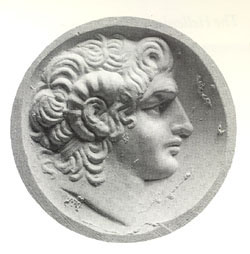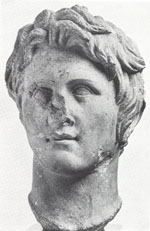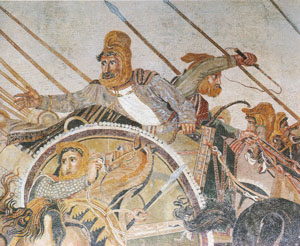
|
Alexander the Great
--Sui Generis
Plutarch penned in his Moralia. De Alexandri magni fortuna aut virtute [Morals. About the Virtue or Fortune of Alexander the Great], "States which never got to know Alexander were as though they had never seen the light of the sun" and "If one were to judge from what Alexander taught and did, he would verify that he was a philosopher." The American producers who aspire to make a film about the life of Alexander the Great should not ignore these two quotations above by well-known and respected philosophers. Hollywood, due to its influence and authority, but also, as former President Clinton wrote, due to the supremacy and muscle the US exercises on a global level, must not be lured into casual scripts and ignore Alexander's magnificence and the fact that he was born a mortal, lived as a superhuman and died as a god. Alexander's accomplishments and endeavors had a profoundly positive effect in the development of future societies. The mighty Romans were the first people to name Alexander "Great." They deified him and not only considered him a role model, but also embraced his life, as well as the arts and sciences that he spread in the East. It was through the Romans that Greek civilization and culture were transferred and established in the West. Thus western civilization was paved and took roots in the western world. Chateaubriand wrote "If someone was compared to a god, that was Alexander." The preceding quotation is not a casual comment. Alexander's speech at Opis in 324 BC, otherwise known as Alexander's Oath, given about one year before his death in the presence of 9,000 Greek and Asian officers, has become the beacon of state leaders and international organizations in their route toward the third millennium. The main points which he made in this speech are as follows: • Now that the wars are over, I wish you to find happiness through peace. • May all mortals live from now on in harmony, as one nation, for the sake of common prosperity. • Consider the world as your country, with common laws, governed by men of merit, regardless of race. • I do not distinguish between Greeks and barbarians, as do the narrow-minded. • I am not interested in the country or race of origin of people. • I only distinguish people according to their virtues. • To me every virtuous foreigner is Greek and each non-virtuous Greek is worse than a barbarian. • If you are ever faced with differences, do not resort to arms, but resolve them peacefully. If need be, I can act as your arbitrator. • God should not be viewed as an authoritarian ruler, but as our common father. • As for myself, I consider all persons, black or white, as equals. • I wish you to be my partners and not just members of our commonwealth. • As far as I am able, I shall see to it that all my promises come true. • Regard this oath as a symbol of love.
A few years ago our ambassador to Islamabad, Pakistan's capital, told me that even today Pakistani school students are learning that the remains of Alexander were placed in a coffin with his hands outside the coffin when he died. The crowd was bearing Alexander's remains around the city, shouting "Alexander's hands were clean when he was born and with clean hands he goes to the other world." Pakistanis even today regard Alexander as their national hero. Alexander never followed Aristotle's advice that he should treat the Greeks differently than the non-Greeks. By respecting the traditions of the people he conquered, eliminating discrimination and prejudice between conquerors and conquered, Alexander the Great elevated the peoples he conquered from an economic, social and political point of view to a higher echelon. That is the reason why Alexander, still today, is loved and respected by a multitude of nations in the East and West and why various legends of different nationalities claim Alexander as their own. Montesquieu, the great French political philosopher, wrote, "When Alexander was gone, nations became orphans." Voltaire, according to Pavlos Tzermias, wrote "Alexander changed the nature of Asia, Greece, and Egypt and gave new direction to the world." With his marriage to Roxane, the daughter of Darius, Alexander was the first one to revoke racial discrimination. He reaffirmed his stance about inequity by assigning individuals from within the peoples he conquered to assume responsible governing positions in his commonwealth. Alexander's behavior toward the relatives of Persian King Darius whom he had captured (his mother, wife and children), was admired by all for the respect that he showed to these royal family members. He did not treat the family of his opponent as a conqueror and as a mighty king would treat enslaved subjects. Darius' mother came to love Alexander as her own son, because in treating her with respect, the purity of his youth became evident to her. She refused to abandon him when there was a plot that gave her the opportunity to escape. After Alexander passed away, she went on a hunger fast for five days and committed suicide, as Kanellopoulos writes. "Darius, you have been conquered by an enemy whose character is far superior of any other human. . .This enemy is virtuous and brave" -- comforting words to Darius, offered by the manservant of Stateira, the wife of Darius, who had escaped when he saw Darius lamenting after the news he received about his wife's death while she was giving birth to their child. Droysen, in his book, Geschichte Alexanders des Grossen [The History of Alexander the Great], wrote that when Darius was informed that the Macedonian king showed every respect toward his captive family and that the dead Stateira was buried with all honors fit for a queen, he raised his arms toward the sky saying, "If I return as a conqueror I want to be able to return Alexander's kindness during my family's misfortune, and if we cease ruling may the gods intervene so no other than Alexander should occupy the throne of Persia." By liberating various cities in the East which were under bondage, Alexander abolished oligarchy and established democracy. He founded cities, theaters, and gymnasia, built new roads, established common currency and promoted commerce among nations. He mitigated Greek civilization in the East and extremely influenced Arab nations. As Dennis Overbye of the New York Times wrote, the meeting of the two civilizations, Greek and Arabian, became an important historic fact. The Arabs translated Greek literary works into Arabic, which subsequently were passed to Europe during the 12th century AD through Latin, thus establishing the basis for the European Renaissance. Dr. Constantine Romanos, Assistant Professor in the Philosophy Department of Aegean University, in his interesting book, The Hellenistic Islam, describes [this period of history]: "the missing Hellenistic legacy of Islam is the missing link of the history of civilization." As Romanos mentions, no research has been done in Greece about this issue; the former Metropolitan of Great Britain, Methodios Fougias, has carried out the only serious attempt. Metropolitan Methodios' remarkable research, combined with the opening of Alexandria's library and the reports of various Egyptian scientists in regards to the great benefits of the legendary ancient library of Alexandria, have helped to gain interest on an international level in the works of Hellenized Islamic philosophers in the Medieval period. As Overbye observed (Kathimerini, 11/04/2001) the scientific work of the Arab philosophers, which was the end result of the success of Alexander the Great, was interrupted by the Crusades, the invasions of the Mongols and the Ottomans. The latter imposed their presence for about five centuries and during that period there was no academic scholarship at all in the area. Overbye wrote that the Ottomans were not interested in sciences and Dr. Romanos observed that they did not identify with Islam. It is not by chance that Mohammed the Prophet refers in the Koran to the double-horned King (Alexander) as a prophet who has the ability to punish those committing injuries against others and to reward the individuals who carry out good deeds.
St. Nectarios, in his book, The Ecumenical Synods, writes "Hellenism spread by Alexander paved the way for Christianity by Emperor Constantine the Great." St. Vassilios the Great does not by chance present Alexander the Great as a role model of self-discipline to young people. Mankind today needs a positive projection of Alexander's deeds and work and this is an ardent aspiration of the UN. This goal could be satisfied by a film supported by true historic veracity, rather than imaginary or profiteering scripts, aiming to humiliate Alexander whom the passing of time has indeed respected. This could result not only in insulting nations conquered by Alexander, but it would also offend the faithful of other great religions. Arrian, in his book The Ascension of Alexander VII, mentions that, according to Aristobulus the historian who accompanied Alexander, the Macedonian king was diligent, fearless, brave, respectful to gods, and self-disciplined in his corporeal pleasures. Arrian adds that it is not of great significance that Alexander committed some errors. He was the only king who was remorseful about his mistakes and this has to do with his gentle nature. According to Aristobulus, the symposia in which Alexander participated did not last long, since Alexander did not drink much. Plutarch, employing Alexander's journal as a source, wrote in his book Parallel Live. Alexander: "Also in wine he was less self-indulgent than what he was considered. He was of the habit of staying at the symposia talking much, but drinking little." Plutarch adds that he was also temperate in eating. Alexander is honored and will be honored and respected forever by the great religions of the world. [Hollywood-style] scripts, therefore, and other attempts to blemish his personality, are ineffective. Regardless of what has been mentioned above, common sense negates allegations about Alexander's homosexuality or drinking habits. It would have been impossible for Alexander to lead his army in such successful military campaigns, achieved by no one preceding or following him, if these attributes were true. Film scripts which attempt to portray Alexander the Great as a homosexual are of poor taste and lack seriousness. Plutarch stated in his Moralia. De Alexandri magni fortuna aut virtute [Morals. About the Virtue or Fortune of Alexander the Great]: "Let us bring up the deeds of those who have generally been identified as philosophers and let us compare their deeds with the deeds of Alexander. Philoxenus, his coast guard commander, wrote to Alexander that he found in Ionia a very handsome boy, one that could be compared to none other in beauty, and that if Alexander wanted the boy, he could send the youth to him. The king replied to him bitterly and in a scolding fashion: 'Horrible man, have you known me up to now guilty of such crimes? How dare you flatter me with such vile pleasures?'" Other points could be brought to disprove Alexander's homosexuality allegations: Alexander was married to Roxane and had an heir by her; he was also married to the daughter of Darius; a queen of the East had asked Alexander to father a child with her. In this age of loss of direction and human dignity, we search for great men to guide and inspire our youth and to elevate the quality of life. Falsification and degradation of the personalities and statuses of long established heroes of history for political or materialistic gains and minimization of their positive effectiveness is not only offensive to every civilized human being, but is also a crime against humanity itself. In the case of Alexander the Great, nothing undertaken by those who now wish to turn historical facts around, in order to try and belittle him or tarnish his fame with unfounded claims, can affect his grandeur and place in [world] history. (To viewers: this article, whose original English translation by Prof. Nina Gatzoulis of the University of New Hampshire,, appears on the website for the Themis-Macedonia project at http://www.greece.org/themis/macedonia, and has been edited by Mary Papoutsy. Some name transliterations have been changed to Latinized and more commonly recognized spellings.)
|



